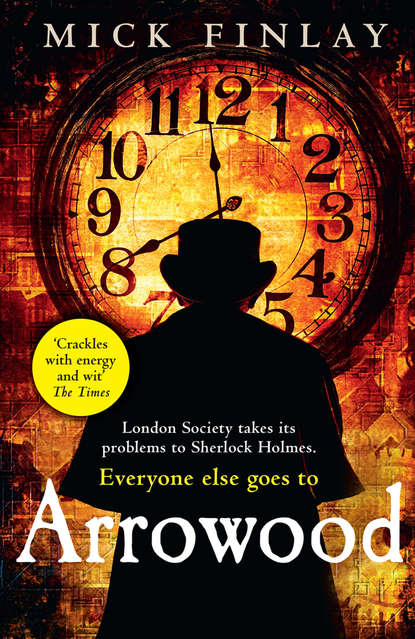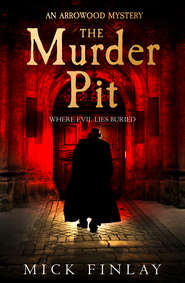По всем вопросам обращайтесь на: info@litportal.ru
(©) 2003-2024.
✖
Arrowood
Автор
Год написания книги
2019
Настройки чтения
Размер шрифта
Высота строк
Поля
‘The truth?’ she asked sternly.
‘The truth.’
She looked me steady in the eye, her nostrils flaring with each intake of the fresh London air.
‘I see,’ she said at last. ‘Perhaps he’s been garrotted, then. It would serve him right.’
I shook my head. ‘There’s a place he goes when he’s upset. An all-night oasis, he calls it. I think he’ll be there.’
Ettie raised her eyes and sighed.
‘What’s upset him this time?’
‘He blames himself for the death of the serving girl. The man we questioned last night said as much. I reckon he wouldn’t have taken it half as bad if the girl didn’t remind him of Isabel, though. You know, he held her off the ground until the police surgeon arrived – wouldn’t leave her on the wet path. He near enough wept in front of the crowd.’
She thought for some time.
‘Has he been drinking since Isabel left?’
‘Not constant. Occasional. Not constant at all.’
She shook her head with impatience. ‘This city is awash with drink. Bottles and jugs are the soldiers of Lucifer, Norman. The poor are in its thrall, according to Reverend Hebden. The working men drink up the children’s food and batter each other and end up standing in the dock. The women scream and fight. They lose their husbands and walk the street. The Ripper was God’s punishment for the drink, there can be no doubt about that. Chinese gin is the latest thing, did you know? And good men like my brother fall into its arms at times of vulnerability. You do not drink yourself, I hope?’
‘In moderation.’
She nodded, stooping to pick up a feather from the floor.
‘We have a fight on our hands, Norman. I’m with Reverend Hebden. The city’s been a monster to the poor. Have you read the accounts of Charles Booth?’
‘No, ma’am.’
‘He says it all. We’re currently ministering to a filthy place called Cutler’s Court. Have you heard of it?’
I shook my head. We stood in the middle of the room, facing each other. She held her back straight, her arms crossed. Her face was solemn as she explained:
‘Over four hundred people living in twenty small houses, and on each side a slaughterhouse. Ten souls asleep in each room. One standing pipe for water and two latrines. Can you imagine? And everywhere you look are piles of oyster shells and bones.’
I could imagine. I had lived in such a place myself not twenty years before. I knew this city. I knew all its evils and all its games.
‘All the dirty trades surround these quarters,’ she went on. ‘The waste from the slaughterhouses sinks into a ditch which runs through the centre of the court. And this is where they empty their toilet pans. The stink’s an insult to Jesus, Norman. The whole court is owned by one man who refuses to install more sanitation. One landlord. But we are there.’
Ettie spoke with passion, and for the first time I caught sight of the spirit which drove her. I felt I understood her a little better for it. She looked at me in silence, expecting an equally strong reply, but I knew that on this subject I’d have to fail her. Though I’d left the court-dwellers behind long ago, I couldn’t talk of them as strangers.
‘What do you do there?’ I asked instead.
‘We campaign for improvements. We help. We pray for guidance. There’s a programme that our organization follows across London – we teach basic hygiene; we hold prayer meetings and provide medicines. The Ladies’ Association for the Care and Protection of Young Girls work closely with us. Do you know them?’
‘I’ve seen the women about town.’
‘I had little sense of the scale of the problem before I came here. You know that William and I were raised in . . .’ She hesitated, and a flush came to her cheek. ‘That is to say, our father had means.’
‘Yes, I knew that, Ettie.’
‘Of course. Anyway, half the women in the court work as prostitutes. In some families both mothers and daughters earn money this way. We try to help the younger ones. There are sanctuaries they can go where they’re taught to do useful work. We try and save them before it’s too late.’
‘Noble work, Ettie.’
‘It isn’t easy. The men don’t like them to be saved, so there’s trouble sometimes, but the poor are our burden and our responsibility. Such it says in the good book, Norman. The war is here. The war is in our backstreets and alleys.’
Her chest heaved with passion beneath the black bodice of her dress. Her forehead was red, and I was pleased when she hesitated and drew a slow breath. I didn’t want to hear any more about the people of the court, my people, for all the bad things they did I had done myself, or watched, or encouraged. I knew everything she described, but I knew it from the other side.
‘But now I worry for my brother. You know where he is, you say?’
‘Don’t worry. I’ll bring him back.’
‘Very good.’ She turned to the stairs. ‘And tell him to bring some muffins. Hot ones, mind. Tell him to pay the full price.’
There was only one other punter in the Hog that morning, a great lascar with a knife in his belt and his hair tied back like a pirate. He lay asleep on a bench by the fire, snoring, his mouth hanging open. A fat woman stood by the counter, rinsing out glasses in a tin bucket. The place stank of tobacco smoke and the spilt beer that lay like a slick over the stone floor. The guvnor was sat upright at a table in the corner, his back to the door. In his clasped hands was a bottle of porter. It was only when I got up close I could see that his eyes were closed. I lay my hand on his shoulder and shook him. He groaned and protested.
‘I’ve instructions from your sister to return you,’ I said.
He opened his bleary eyes for a second to look in my direction, then immediately let his head fall onto the table.
I put my arm under his and hauled him up. He was heavy. He was heavier each time.
The woman tutted and sighed as I struggled with his leaden carcass.
Slowly, his feet began to shuffle in irregular steps. He groaned again and wiped his mouth; his eyes opened to slits; his red face puckered up. He belched in my ear. But at least he was walking, after a fashion.
‘Lovely making your acquaintance, Hamba,’ he mumbled at the sailor, who continued to snore on the wooden bench.
‘Take him with you, why don’t you?’ said the woman with a laugh.
The guvnor turned and bowed loosely at her.
‘A pleasure, my petal,’ he burbled.
‘I hope you ain’t thinking of leaving before you give Betts the crown you owe her, Mr Arrowood. She made me promise to collect it from you.’
‘Ah,’ he spluttered, fumbling in his waistcoat for his coins, ‘of course, yes.’
The coins spilled onto the floor. I scooped them up, gave the woman a crown, then stuffed the rest into his pocket.
Without letting go of my arm, he bowed once more. When we gained the street he grunted at the sudden light and covered his eyes.
‘Carry me, Barnett.’
‘Walk on.’






